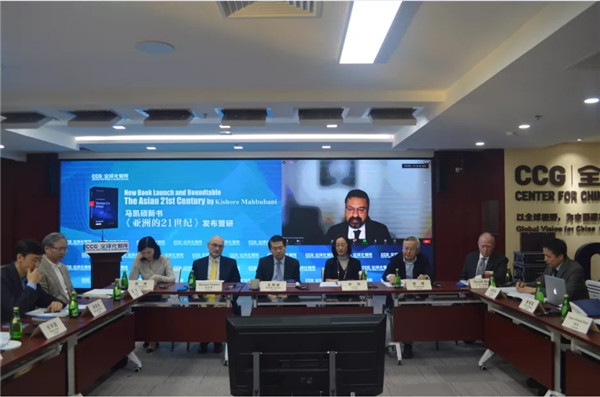Anil Chandy’s Speech at CCG Seminar on The Asian 21st Century
January 11 , 2022
On Tuesday Jan 11, 2022, the Center for China and Globalization (CCG) held a seminar featuring renowned diplomat-turned-scholar Kishore Mahbubani to release his new book “The Asian 21st Century”, as part of CCG’s “China and Globalization” series in partnership with Springer Nature.
Springer Nature Singapore Managing Director Anil Chandy explained to the audience the significance of this book, hoping it can guide and inspire us to find Asia’s potential and new role in globalization of the 21st century.
Full text of his remarks is as below:
President Prof Wang, Prof Kishore Mahbubani, Series Editor Prof Lu, Distinguished panelists, Friends from the Centre for China and Globalization, and dear colleagues. I am very happy to join you from Singapore today.
And to be here representing the publisher along with my colleagues to start this eagerly anticipated session, announcing and debating what will surely be one of Springer Nature’s highlight titles in 2022. Prof. Kishore’s seminal essay collection titled, The Asian 21st Century in the China and Globalization Book Series, which is a significant collaboration between the Centre for China and Globalization and Springer Nature.
Its also a privilege for me to speak here for two reasons:
First, Publishing Prof. Kishore. We did it! Congratulations to everyone.
Prof Kishore is probably Singapore’s best known international voice and we at Springer Nature Singapore are proud to assist in making that voice heard again around the world. Globally, as part of the Humanities and Social Sciences program each year we publish over 4000 titles but this one is rare and a great way to signal the start of 2022. Publishing this book has been a significant milestone for us at Springer Nature.
Singapore is known for many things: our prowess in the financial world, openness and transparency conducting business, our innovations in engineering, in robotics, biomedical and medical fields, world class institutions, our systematic, inclusive and multi-cultural approach to nation building and of course the deep desire to be world class in everything we do.
What its less well-known for and this is not just Singapore but most of Asia in some sense is thought leadership in the international politics arena and contributions to extending the study of international, area and diplomatic studies. With one major exception: the work of Prof Kishore.
Along with a distinguished diplomatic career of 33 years and founding the LKY school of public policy, the seminal essay in 1998 “Can Asians think” was the first intervention by an Asian scholar that truly preset a question that would shape the world, which was evolving in the 21st century.
It showed us, as do the essays in this collection, how Prof Kishore has been a tireless student and driver of international politics and policy, setting the agenda of debate in everything that is of importance in international politics.
Sometimes his views are debated and challenged but the fact that they are prescient, prescriptive and absolutely essential is a central fact.
As an ode to his wide interests, expertise and influence on Singapore’s policies across diverse fields, Prof Kishore also had a Professorship named after him recently at the Yong Loo Lin School of Medicine at the National University of Singapore.
My second reason is a deeply personal one:
In 1998 as a grad student, my supervisor, Kanti Bajpai made reading Kishore Mahbubani absolutely the law during our graduate course work. So I just did not have to read him, but I had to learn him. Although I did not choose a career in international relations all of us in the course were deeply influenced by the clarity of thought and vision that characterizes Prof Kishore’s writing, which Kanti sometimes urged us to model our own approach to studying global problems.
I will leave the distinguished experts in the panel for clearer views and discussion of how seminal this collection is from the discipline’s perspective.
But I can’t help myself asking the question, why do we chose to live with the paradoxes Prof Kishore highlights that currently characterize international politics?
Is it to an extent influenced by a triumph of empiricism and the advent and progress of rational choice theories on mainstream international relations; and their failure to set the debate in the correct context?
Or is the cause the premature announcement of the victory of liberal democracies and institutionalism, which then was disrupted by regional wars and aggrandizing political behavior?
The topical spread and coverage of Prof Kishore’s essays is truly breathtaking and essential. From American missions and alleged exceptionalism, Regional Order, to Chinese thought, India, Japan to climate change and the pandemic.
He grapples with every big question of our times, prods our curiosity and also gives emphatic answers to some of those questions and prescribes what we need to make course corrections.
And that is the essential Mahbubani.
He provokes and he teaches. And that is why this collection from the CCG is one of the finest we are privileged to offer in our program.
Thank you!
Topical News See more






